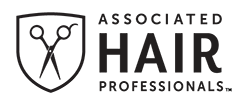posted on: 05/26/2023
By Liz Kline
If you are anything like me, protecting yourself in a salon setting is extremely important—not just to help prevent the spread of diseases from one client to the next, but also to ensure we are practicing safe infection control to protect ourselves and others in the salon. Early in our cosmetology or barbering education, it is drilled in our heads that we assume all human blood and bodily fluids are potentially infectious. We learn about disinfection, cleaning solutions and what to do in the unfortunate event we encounter blood or a bodily fluid. But one thing that’s not discussed often enough is how can we protect ourselves even further from chemicals, airborne fumes, and any other potential hazardous materials we work with daily.
I bring up this topic because I have read and heard from so many fellow licensed professionals of allergic reactions, irritations, and rashes on our skin. Many people ask me what it could be or how to prevent it. So, I decided to do some research—here are some interesting facts I have found.
According to a fact sheet from Women’s Voices for the Earth, “some surveys found that over 60 percent of salon workers suffer from skin conditions, such as dermatitis, on their hands.” This makes sense, considering our hands are frequently in water and we come in contact with hair color, bleach, perm and relaxer solutions, and in some cases acrylic nail products.
The fact sheet also states that “Studies have measured decreased lung function in both hairdressers and nail salon workers. Both groups also have higher risks of developing asthma.” Some of the chemicals that are used almost daily release toxic fumes once heat is applied from blow-dryers or flatirons. Some of these chemicals include acetone, toluene, ammonia, and methyl methacrylate—all of which are commonly found in nail polish, hair extension glue, thermal protectant sprays, and hair dyes.
“Hairdressers and cosmetologists may be more likely to give birth to low-birth-weight babies, especially when their work involves using hairspray and permanent waves. Studies of hairdressers have also found an increased risk of miscarriage and babies born with cleft palates and other birth defects,” the fact sheet says. Although some studies have been done, it should be noted that more research is needed to determine the hazardous chemicals that can cause infertility.
Understanding these statistics, I believe the passion I have for this career can be fueled into doing something more to help protect myself and those around me. Let me start out by saying that although it may sound scary to hear some of the side effects of doing what we love, we need to have a conversation with ourselves about the arsenal we have to work smarter and not harder.
First things first: gloves. We all know we should be wearing gloves when mixing chemicals and during the application process. But are we still wearing them when we wash out the chemical? Are we wearing gloves with every use of shampoo and conditioner? I’ve heard it before and have even asked it myself: Why would I need to wear gloves with every wash service? Well, many shampoos and conditioners contain retinyl palmitate. This ingredient can cause itching, scaling, and peeling skin on our hands. Furthermore, sulfates can cause allergic reactions and selenium sulfide found in anti-dandruff shampoos is a carcinogen. These are just a few ingredients that might not do harm in small amounts, but with frequent, daily use on bare hands, they could potentially have long-term effects.
Next: masks. While many people no longer wear masks for COVID-19, masks help protect us in the salon due to the fumes that can be released into the air during mixing, application, or when heat is applied. Those fumes can be linked to asthma and respiratory issues.
Let’s talk ventilation. This is a biggie. No matter what we use, how little we use it, or how often we use it, we want to ensure we have proper ventilation in the salon or barbershop. Poor ventilation can keep airborne chemicals.
So what can you do? Opt for less toxic products, such as paraben-, sulfate-, and fragrance-free options. You’ll also want to look for a non-dusty form of persulphates, which can be found in many bleach powders and bleaching creams.
Whatever you decide to do, I encourage you to protect yourself so you can have a happy, successful career in the hair industry.
These are just a few of many groups available to us across different platforms. No matter how you decide to reach out to your fellow professionals and come together as a community, your connection can only benefit you.
 Like articles like this or want to learn more about something else? Let us know!
Like articles like this or want to learn more about something else? Let us know!
For more useful tools to help advance your career and knowledge, join AHP. We have education at your fingertips with our free online scheduling, AHP Indie Stylist Magazine, Marketing Toolkits, and more!
Not a member? Join today and get access to all of the benefits we offer to support you and your career as a barber or cosmetologist.
